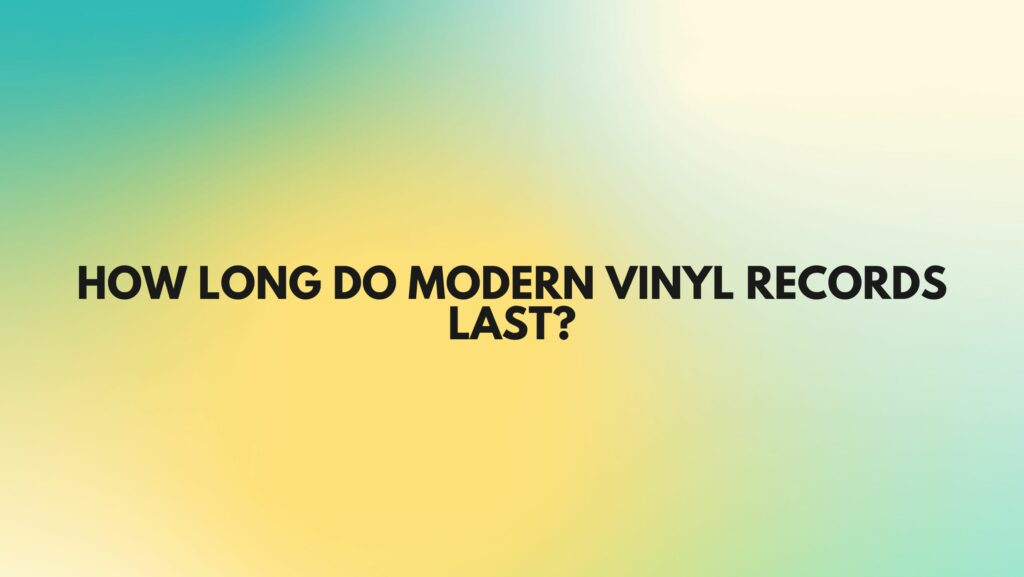In the age of digital music, vinyl records have experienced a remarkable resurgence in popularity. Collectors and music enthusiasts are drawn to the tactile and analog nature of vinyl, which offers a unique and immersive listening experience. However, questions about the longevity of modern vinyl records often arise. How long can you expect them to last? In this comprehensive article, we will explore the factors that influence the lifespan of modern vinyl records and provide guidance on how to ensure their durability.
The Composition of Modern Vinyl Records
Modern vinyl records are typically made of polyvinyl chloride (PVC) compounds. These compounds are combined with various additives to create a durable material suitable for record pressing. While PVC-based records are generally robust and long-lasting, certain factors can affect their longevity.
- Vinyl Thickness: The thickness of the vinyl used for a record can impact its durability. Standard vinyl records are typically 120 to 140 grams, but some audiophile-quality records can be 180 grams or more. Thicker records tend to be more resistant to wear and warping.
- Quality Control: The quality of the pressing process is crucial. Records pressed at reputable plants with rigorous quality control measures are more likely to have a longer lifespan.
- Mastering and Cutting: The quality of the mastering and cutting process, which determines the grooves’ depth and precision, affects how well the stylus tracks the record. Proper mastering and cutting reduce the wear on both the record and the stylus.
- Handling and Storage: The way you handle, clean, and store your vinyl records can significantly impact their longevity. We’ll discuss this in more detail later in the article.
Factors Affecting Vinyl Record Lifespan
Several factors influence how long modern vinyl records will last. These include:
- Wear and Tear: The repeated friction of the stylus in the record’s grooves causes gradual wear. Over time, the grooves may become shallower, affecting sound quality.
- Dust and Debris: Dust and debris can accumulate on the record’s surface, leading to surface noise and potential damage if not cleaned properly.
- Exposure to Sunlight and Heat: Prolonged exposure to direct sunlight and high temperatures can cause warping and deformation of vinyl records.
- Storage Conditions: Proper storage is essential for record longevity. Records should be stored upright, in a cool, dry place, and away from extreme temperature fluctuations.
- Maintenance: Regular maintenance, including cleaning your records and stylus, is crucial for extending their lifespan.
How Long Can Modern Vinyl Records Last?
The lifespan of modern vinyl records can vary widely based on the factors mentioned above. With proper care and storage, many vinyl records can last for decades or even longer. Some collectors have records in their collections that are over 50 years old and still sound excellent. However, it’s important to acknowledge that records subjected to neglect, mishandling, and adverse conditions may not enjoy the same longevity.
Tips for Extending the Lifespan of Modern Vinyl Records
To maximize the longevity of your modern vinyl records, consider the following tips:
- Proper Cleaning: Regularly clean your records with a dedicated vinyl record brush or cleaning solution to remove dust and debris that can cause wear.
- Store Upright: Keep your records stored vertically to prevent warping and damage to the grooves.
- Use Anti-Static Sleeves: Place your records in anti-static inner sleeves to minimize static buildup and prevent dust attraction.
- Avoid Sunlight and Heat: Store your records away from direct sunlight and extreme temperatures to prevent warping and damage.
- Handle with Care: Always handle your records by the edges and avoid touching the playing surface to minimize the transfer of oils and dirt.
- Use a Quality Turntable: Invest in a high-quality turntable with a good tonearm and stylus to reduce wear and minimize the potential for mistracking.
- Check Your Cartridge: Ensure your cartridge is properly aligned and balanced to avoid excessive stylus pressure on the grooves.
Conclusion
Modern vinyl records, when properly handled, maintained, and stored, can provide decades of listening enjoyment. While records may exhibit some wear over time, they can continue to deliver high-quality sound. However, neglect, improper storage, and mishandling can significantly reduce their lifespan. By following best practices for care and maintenance, you can extend the longevity of your modern vinyl records and continue to enjoy the rich, analog sound that makes vinyl a beloved medium for music enthusiasts.


